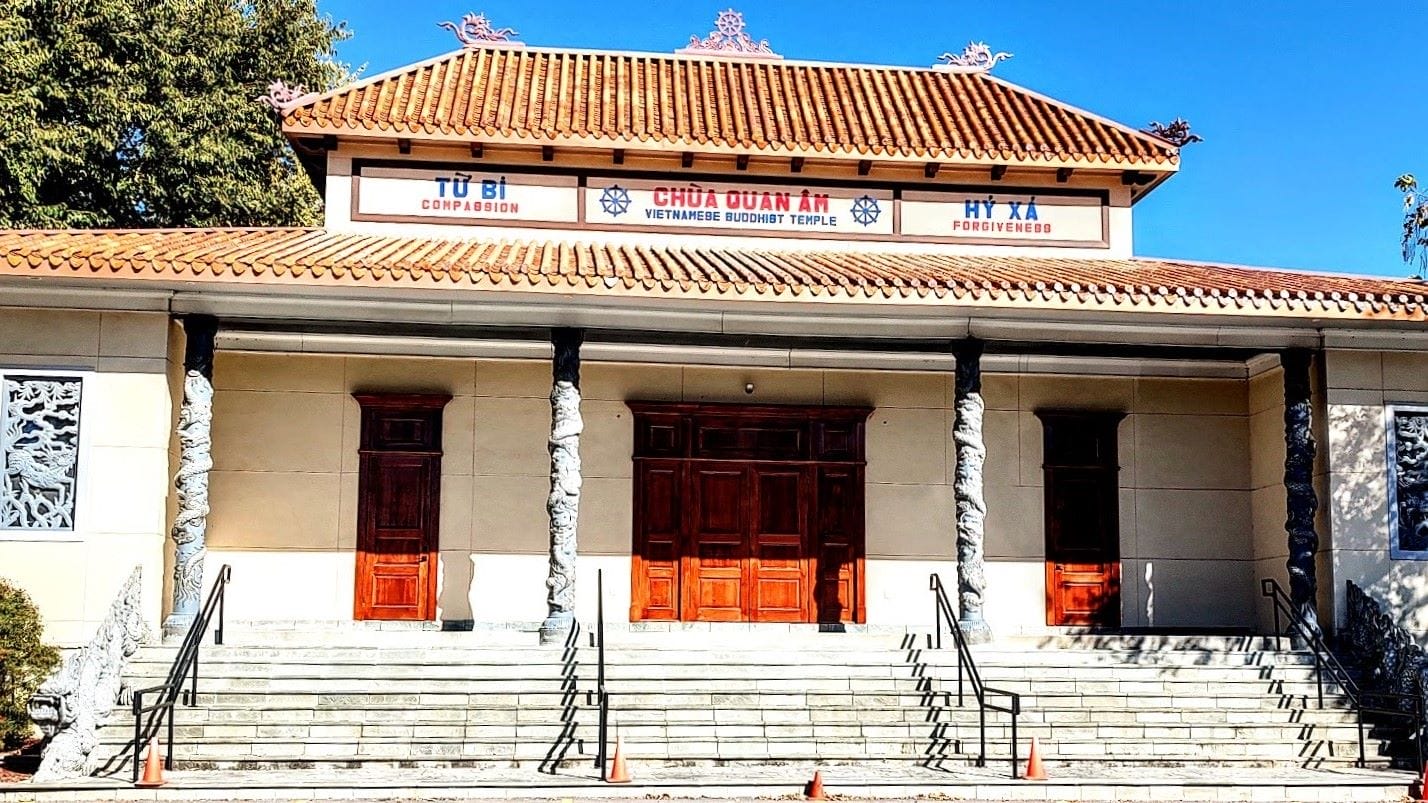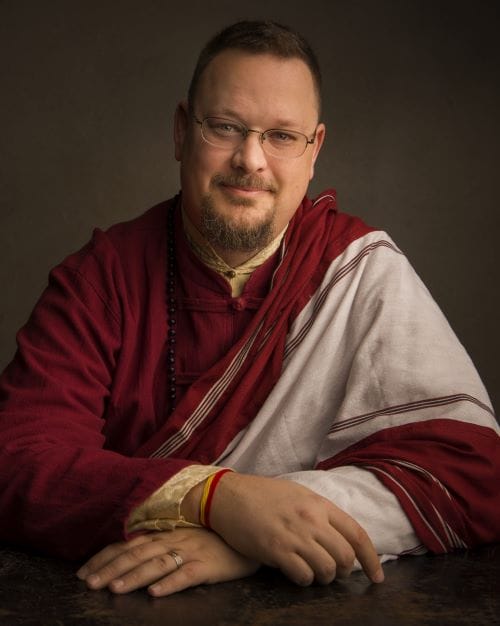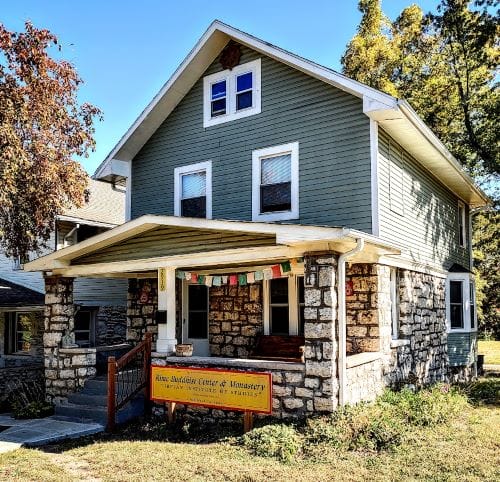Buddhism: Religion, Philosophy or Way of Life? Popular Option for Spiritual Seekers
Published November 26th, 2023 at 6:00 AM
Above image credit: This home at 10th and Bales in Kansas City’s northeast now houses the Phap Hoa Buddhist Temple. (Bill Tammeus | Flatland)When Rick Zbinden, now a clinical social worker in Kansas City, grew up in Fulton, Missouri, he and his parents sporadically attended a now-defunct United Methodist Church there.
But that didn’t satisfy his spiritual hunger. So, he says, “I flirted with kind of the heaven-and-hell thing when I was in high school and college. I went to the Church of Christ and they scared the crap out of me.”
Today, he says, “the phrase ‘spiritual but not religious’ sort of describes me.” So, he’s found a home in Buddhism, whose followers debate whether — because it’s non-theistic — it’s a religion, a philosophy or just a way of life.
And Zbinden is far from alone among area residents. Buddhist centers dot the metro’s landscape and offer the three primary branches of Buddhism, though groups practicing what’s called Western Buddhism are prominent. Those include the Temple Buddhist Center, which Zbinden attends on Sunday mornings inside the building that houses Unity Temple on the Plaza.
Other area centers include Wat Lao, which caters to people of Laotian descent, and the Tu Bi, Chùa Phổ Hiền, Phap Hoa Temple and Quan Am Temple centers. They attract followers of Vietnamese descent and are located in northeast Kansas City neighborhoods. And the Buddhist Center at 1804 Broadway, part of Soka Gakkai International, offers Nichiren Daishonin Buddhism, with roots in Japan.

What drew Zbinden to Buddhism, he says, “was a midlife crisis. And rather than chasing 25-year-old women and buying a Ferrari, I started meditating and going to a Buddhist center. To me, the thing that was compelling was the philosophy around attachments.
“Buddhism will tell you that all suffering is because of attachments to things that we want outside ourselves. It kind of sucks to hear that but I think that’s right.”
The director of the Temple Buddhist Center (TBC), Victor Dougherty, also came to Buddhism as someone “in great crisis,” he says. “The only thing that I found that brought me any sense of solace was a book that a friend gave me called ‘Buddhism Is Not What You Think’.”
Dougherty’s therapist at the time told him this: “Victor, I don’t think you’re having a mental crisis. I think you’re having a spiritual one.” The therapist sent him to the American Buddhist Center at Unity, now named TBC.
“The moment that I began hearing the teachings and studying meditation and mindfulness,” he says, “I felt I was home. I’ve been there ever since.” Just over six years ago, Dougherty, who taught speech, debate and theater in area high schools for more than two decades, became TBC’s director.
The Rime Buddhist Center is one of the best-known homes for Buddhism in our area. It’s now on the city’s East Side at 2939 Wayne Ave., and offers Tibetan Buddhism with a Western flavor.

“I do see a lot of spiritual seeking,” says Rime’s lama, Matthew Palden Gocha, “including people who still identify as Christian. People bring their spiritual path with them, and they ask really interesting questions.”
Some of those Christians remain Christian even while adopting Buddhism. That’s true of Kansas City attorney Douglas K. Anning, who describes himself variously as an Episcopal Buddhist or a Buddhist Episcopalian.
“I was drawn to Buddhism partly by accident or fate, depending on one’s perspective,” he says. “I was walking down the street one day when I was 19 and a sophomore at KU, and I happened to wander by the Kansas Zen Center. I decided to check it out on a whim, and for the last 40 years, Buddhism has been part of my spiritual journey to greater and lesser extents, ebbing and flowing as time has flown by.
“Now what I tend to say is that I view the world through a Buddhist lens, including Christianity. Buddhism is my ordering principle, and it helps me better understand and articulate my Christian beliefs.”
Buddhism in Kansas City is, in some ways, reflective of all religious traditions here in that change happens regularly. For instance, differences over the future path of the American Buddhist Center at Unity some years ago led the late Lama Chuck Stanford to leave and start the Rime Center. And a group known as the Kansas City Buddhist Center, which used to meet at the Pilgrim Chapel in Midtown, decided recently to close for good because of the effects of the COVID pandemic.
In a Facebook note, center leaders explained that “the cost of reestablishing ourselves with rent, insurance and other expenses is simply not sustainable for the continued operation of our organization.”
Some area Christian churches — not unlike the Methodist church of Zbinden’s boyhood — have experienced similar troubles and have closed, merged into other congregations or moved. Even the Rime Center moved, mostly for financial reasons.
Rime’s Lama Matt says that when Buddhist centers flourish it’s because “people are drawn to Buddhism because of its philosophical aspects. It’s working with mind and emotion. There’s a compassion element that might draw people in, working to alleviate suffering. I think that speaks to a lot of people.”

Known as Matthew Rice in his secular work for Mosaic, he says he “had been raised Southern Baptist. But there was something about Buddhism’s Four Noble Truths that really spoke to me. You know, there’s suffering in the world. There’s a cause of that suffering, which is ignorance or unknowing or misunderstanding. Then there’s a cessation to suffering and then a spiritual path,” and for him that path was Buddhism.
Dougherty at TBC says Buddhism “does not come as a conqueror. It comes as a pilgrim.”
So, he says, when it came to Japan, it became Zen Buddhism. When it came to the West, “Buddhism found a sisterhood with psychology. What psychology was lacking in spirituality, Buddhism could bring that in, and what Buddhism was lacking in a concrete, pragmatic way to incorporate spirituality, psychology offered that.”
Buddhists today make up only about 1% of the U.S. population, and it’s likely that Kansas City area Buddhists are a similarly tiny percentage of the population.
But Dougherty and others sense a growing interest in Buddhism, especially among young people. In fact, Dougherty calls this “a Gutenberg moment — and for several reasons. Never in human history have individuals had at their fingertips all the great spiritual writings and spiritual teachings. You can see them all right next to each other. It’s a very exciting time to be waking up.”
In that spirit, Doug Anning says Buddhism has clarified what Christianity taught him.
“A life of accumulation is foolish selfishness. But practicing compassion is wise selfishness.”
Bill Tammeus, an award-winning columnist formerly with The Kansas City Star, writes the “Faith Matters” blog for The Star’s website, book reviews for The National Catholic Reporter and for The Presbyterian Outlook. His latest book is “Love, Loss and Endurance: A 9/11 Story of Resilience and Hope in an Age of Anxiety.” Email him at wtammeus@gmail.com.


